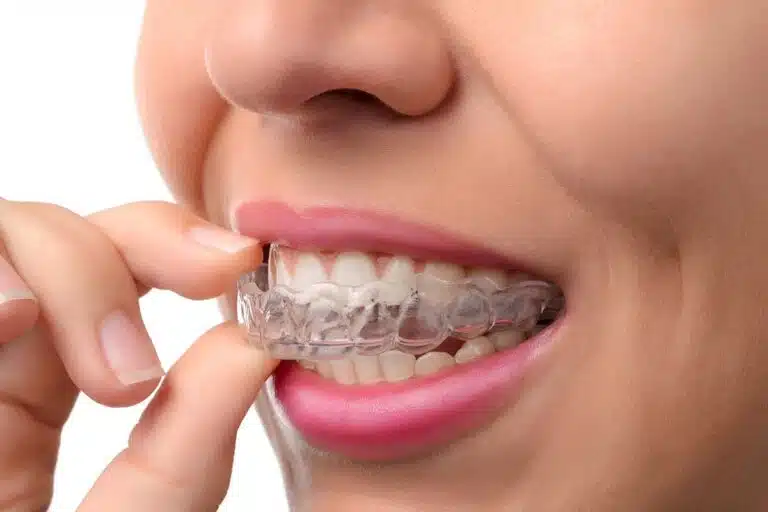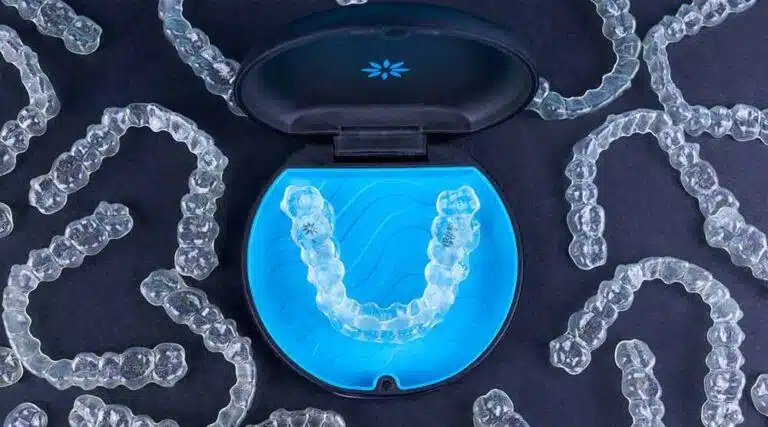Teeth Protrusion in Kids and Adults-Causes, Consequences and Treatment Options
Teeth protrusion, also known as overjet, is a condition in which the upper teeth extend farther than the lower teeth when the mouth is closed. It can be a normal variation in tooth alignment or a problem that requires treatment. Teeth protrusion in kids is often a result of genetics, thumb sucking, or incorrect swallowing habits. Some orthodontic issues, such as crowding or a misaligned jaw, can cause it. If left untreated, teeth protrusion in kids can lead to problems with the bite, difficulty speaking or eating, and even facial deformities. In adults, teeth protrusion can result from a variety of factors, including changes in jaw structure, tooth loss, and gum disease. It can also result from neglecting to wear orthodontic appliances as directed or not receiving proper treatment for orthodontic issues in childhood.
Treatment options for teeth protrusion in kids and adults may include braces, clear aligners, or surgery, depending on the severity of the condition and the patient’s age. It is essential to consult a dental professional to evaluate and determine the best course of treatment.
Causes of teeth protrusion in kids and adults
Genetics
Genetics can play a role in the development of teeth protrusion in kids. It is not uncommon for children to inherit certain dental and facial features from their parents, including the shape and size of the teeth, jaw structure, and position. If a child’s parents or other family members have teeth protrusion or other orthodontic issues, the child may be more likely to develop similar problems.
Thumb sucking
Thumb-sucking is a common habit among children and is generally considered a typical and harmless behavior. However, if a child continues to suck their thumb or finger beyond the age of 4 or 5, it can potentially lead to problems with the alignment of their teeth and jaw.
Thumb sucking can cause the front teeth to protrude outward, a condition known as overjet. It can also cause the upper and lower jaws to become misaligned, leading to orthodontic problems such as an open bite or crossbite.
If your child continues to suck their thumb beyond the age of 4 or 5, it is vital to address the habit and try to break it. You can use several strategies to help your child stop thumb-sucking, such as
- Praising them for not sucking their thumb,
- Offering positive reinforcement when they stop sucking or
- Using a thumb-sucking deterrent such as bitter-tasting nail polish.
If these strategies do not work, it may be necessary to seek the help of a dental professional like Luna Orthodontist near sugar land Texas or a child psychologist.
Incorrect swallowing habits
Incorrect swallowing habits can lead to tooth protrusion in kids. Swallowing habits refer to how a person moves the tongue and muscles of the mouth and jaw when swallowing. One common incorrect swallowing habit that can cause teeth protrusion in kids is called tongue thrusting. This is when the tongue pushes against the front teeth during swallowing, which can cause the front teeth to protrude outward. Various factors, including genetics, allergies, or respiratory problems, can cause tongue thrusting.
Treatment options for tongue thrusting may include exercises to correct the swallowing pattern, speech therapy, or orthodontic appliances such as a retainer or a tongue crib. A dental professional like Luna who have been accredited as the Elara Orthodonticss in Richmond Texas or a speech therapist can help diagnose and treat any swallowing problems your child may have.
A misaligned jaw
A misaligned jaw, also known as a malocclusion, can cause teeth protrusion, also known as overjet. When the jaw is misaligned, the upper and lower teeth may not fit together correctly, leading to problems with the bite and the appearance of the teeth.
Several malocclusions can cause teeth protrusion, including an overbite, an underbite, and a crossbite.
Treatment options for a misaligned jaw causing teeth protrusion may include braces, clear aligners, or surgery, depending on the severity of the condition and the patient’s age.
Teeth crowding
Teeth crowding might cause teeth protrusion, also known as overjet. Crowding occurs when insufficient space in the mouth for all teeth to fit properly, resulting in crooked or overlapping teeth. Various factors, including genetics, irregular tooth shapes, or the size and shape of the jaw, can cause crowding. It can also be a result of neglecting to wear orthodontic appliances as directed, or not receiving proper treatment for orthodontic issues in childhood.
If teeth crowding is causing teeth protrusion or other orthodontic problems, treatment options may include braces, clear aligners, or extractions to create more space in the mouth. It is important to consult a dental professional to evaluate and determine the best course of treatment.
Changes in the jaw structure
Changes in the jaw structure can cause teeth protrusion in adults. The jaw bones, the maxilla and the mandible support and anchor the teeth. If the shape or position of the jaw bones changes, it can affect the alignment of the teeth. Several factors can cause changes in the jaw structure, including genetics, injury, and certain medical conditions. For example, a condition called jaw joint disorder (TMJ disorder) can cause changes in the jaw structure and lead to teeth protrusion. Other causes of jaw changes include tooth loss, gum disease, and natural aging.
Tooth loss
Tooth loss can cause teeth protrusion in adults. When a tooth is lost, the surrounding teeth may shift or drift out of their proper position, causing misalignment. This can lead to problems with the bite and the teeth’ appearance, including protrusion. Factors including decay, gum disease, and injury, can cause tooth loss. It is essential to replace missing teeth as soon as possible to prevent problems with the alignment of the teeth and to maintain the integrity of the bite.
If you are an adult experiencing teeth protrusion and suspect that it may be caused by tooth loss, it is essential to consult a dental professional for an evaluation. They can assess your dental health and recommend the appropriate treatment, including replacing the missing teeth with a bridge, dentures, or dental implants.
Gum disease
Gum disease can cause teeth protrusion in adults. Gum disease, also known as periodontal disease, is an infection of the teeth, gums and other supporting structures. It is caused by the build-up of plaque and tartar on the teeth, which can lead to inflammation and receding gums.
If left untreated, gum disease can cause the gums to recede, exposing more of the tooth root. This can cause the teeth to become loose and unstable, leading to misalignment and problems with the bite. It is vital to maintain good oral hygiene and to see a dental professional regularly to prevent gum disease and to address any issues that may arise.
Excessive grinding
Excessive grinding, also known as bruxism, can cause tooth protrusion in adults. Bruxism is the habit of grinding or clenching the teeth, often during sleep. It is a common condition that can cause problems with the teeth and jaw, including tooth sensitivity, headaches, and damage to the teeth.
Excessive grinding can cause the teeth to become worn down or damaged, leading to problems with the bite and the appearance of the teeth. In some cases, it can cause the teeth to protrude outward.
Trauma
Trauma, or injury to the mouth or jaw, can potentially cause teeth protrusion in adults. Trauma to the teeth or jaw can cause the teeth to become loose, knocked out, or displaced from their normal position, leading to problems with the bite and the appearance of the teeth.
There are several ways in which trauma can occur, including accidents, sports injuries, and physical altercations. If you have experienced trauma to the mouth or jaw and are experiencing teeth protrusion or other dental problems, it is crucial to seek medical attention as soon as possible.
Treatment for trauma-related teeth protrusion will depend on the injury’s severity and the damage to the teeth and jaw. It may include stabilizing or splinting loose teeth, replacing missing teeth with a bridge, dentures, dental implants, or surgery to repair the jaw or teeth. It is essential to consult a dental professional to evaluate and determine the best course of treatment.
Poor Oral Hygiene
Poor oral hygiene is one of the most common causes of protruding teeth. When plaque and tartar build-up on the surface of your teeth, they start to project outward, creating a protrusion. Brushing and flossing twice daily can help prevent this build-up from happening in the first place.
Excessive use of a pacifier
When a child sucks on a pacifier, they are likely to use their front teeth as leverage. This can lead to an overbite or protrusion of the front teeth. This is especially concerning when it comes to baby teeth since these are temporary and will eventually fall out anyway. If there is too much pressure being applied to the front teeth, it can cause them to protrude outward. This can lead to a gap between the baby teeth and permanent teeth which will eventually come in. The gap can also make it difficult for the permanent teeth to come in properly or line up correctly with the rest of the adult teeth.
Consequences of tooth protrusion
Difficulty speaking or eating
Teeth protrusion can cause problems with how the teeth meet when the mouth is closed, making it difficult to speak clearly or chew properly.
Problems with the bite
Teeth protrusion can cause problems with how the upper and lower teeth fit together, leading to an improper bite.
Damage to the teeth
Teeth protrusion can cause the front teeth to be more prone to injury or damage due to their prominent position.
Facial deformities
Teeth protrusion can cause the face to appear unbalanced or asymmetrical, leading to concerns about appearance.
Self-esteem issues
Teeth protrusion can affect a person’s self-esteem and confidence due to concerns about appearance and the ability to speak or eat correctly.
Treatment options for teeth protrusion in kids and adults
There are several treatment options available for teeth protrusion in kids and adults. The most appropriate treatment will depend on the severity of the condition and the patient’s age. Some potential treatment options include:
Braces
Braces are a standard treatment for teeth protrusion and other orthodontic problems. They use gentle pressure to move the teeth into their proper position gradually.
Clear aligners
Clear aligners, such as Invisalign, are a removable alternative to braces. They are made of a transparent, flexible material that fits over the teeth and applies pressure to move them into their proper position.
Retainers
Retainers are appliances that hold the teeth in place after orthodontic treatment, such as braces. Individuals can use them to prevent teeth protrusion from worsening or maintain treatment results.
Tongue cribs
Tongue cribs are small appliances that fit over the front teeth and prevent the tongue from thrusting against them. One can use them to treat teeth protrusion caused by incorrect swallowing habits.
Surgery
In severe cases of teeth protrusion, surgery may be necessary to reposition the jaw or teeth. This treatment is typically reserved for adults and is performed by an oral and maxillofacial surgeon.
It is essential to consult a dental professional to evaluate and determine the best course of treatment for teeth protrusion. They can assess your dental health and recommend the appropriate treatment plan.
In conclusion, addressing teeth protrusion in kids and adults is crucial. Proper hygiene, discouraging thumb sucking and avoiding excessive pacifier use are several ways to address teeth protrusion. If you are in Texas, you can contact Luna Orthodontist near sugar land Texas for your orthodontic needs. Call and schedule an appointment with the Elara Orthodonticss in Richmond Texas. We are available Monday to Friday. Contact us at (713) 360-0850.




